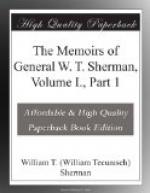From 1820 to the Mexican war.
1820-1846.
According to Cothren, in his “History of Ancient Woodbury, Connecticut,” the Sherman family came from Dedham, Essex County, England. The first recorded name is of Edmond Sherman, with his three sons, Edmond, Samuel, and John, who were at Boston before 1636; and farther it is distinctly recorded that Hon. Samuel Sherman, Rev. John, his brother, and Captain John, his first cousin, arrived from Dedham, Essex County, England, in 1634. Samuel afterward married Sarah Mitchell, who had come (in the same ship) from England, and finally settled at Stratford, Connecticut. The other two (Johns) located at Watertown, Massachusetts.
From Captain John Sherman are descended Roger Sherman, the signer of the Declaration of Independence, Hon. William M. Evarts, the Messrs. Hoar, of Massachusetts, and many others of national fame. Our own family are descended from the Hon. Samuel Sherman and his son; the Rev. John, who was born in 1650-’51; then another John, born in 1687; then Judge Daniel, born in 1721; then Taylor Sherman, our grandfather, who was born in 1758. Taylor Sherman was a lawyer and judge in Norwalk, Connecticut, where he resided until his death, May 4, 1815; leaving a widow, Betsey Stoddard Sherman, and three children, Charles R. (our father), Daniel, and Betsey.
When the State of Connecticut, in 1786, ceded to the United States her claim to the western part of her public domain, as defined by her Royal Charter, she reserved a large district in what is now northern Ohio, a portion of which (five hundred thousand acres) composed the “Fire-Land District,” which was set apart to indemnify the parties who had lost property in Connecticut by the raids of Generals Arnold, Tryon, and others during the latter part of the Revolutionary War.
Our grandfather, Judge Taylor Sherman, was one of the commissioners appointed by the State of Connecticut to quiet the Indian title, and to survey and subdivide this Fire-Land District, which includes the present counties of Huron and Erie. In his capacity as commissioner he made several trips to Ohio in the early part of this century, and it is supposed that he then contracted the disease which proved fatal. For his labor and losses he received a title to two sections of land, which fact was probably the prime cause of the migration of our family to the West. My father received a good education, and was admitted to the bar at Norwalk, Connecticut, where, in 1810, he, at twenty years of age, married Mary Hoyt, also of Norwalk, and at once migrated to Ohio, leaving his wife (my mother) for a time. His first purpose was to settle at Zanesville, Ohio, but he finally chose Lancaster, Fairfield County, where he at once engaged in the, practice of his profession. In 1811 he returned to Norwalk, where, meantime, was born Charles Taylor Sherman, the eldest of the family, who with his mother was carried to Ohio on horseback.




